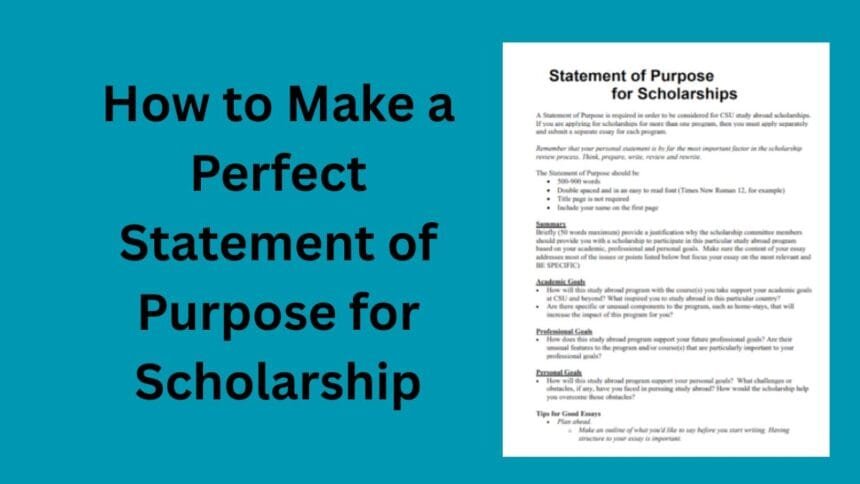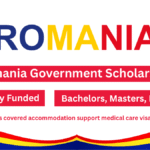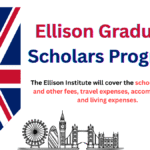If you are applying for scholarships one of the most important documents you will need is a Statement of Purpose 2026 (SOP). Many students focus only on grades or achievements but in reality the SOP is the deciding factor that can set you apart from thousands of applicants. A well written SOP not only shows your qualifications but also tells your story your motivation and your future goals.
This guide explains how to make a perfect Statement of Purpose for scholarship applications with tips examples and a step by step method to help you write a strong document.
What Is a Statement of Purpose for Scholarship
A Statement of Purpose is a personal essay that describes your academic journey professional goals and reasons for applying to a specific program or scholarship. It tells the selection committee why you deserve financial support and how you will use the opportunity to benefit yourself and others.
Unlike a CV or resume which lists facts the SOP reflects your personality passion and vision.
Also See: Statement of Purpose Generator for Scholarship
Why Is the SOP So Important for Scholarships
Scholarship committees often receive hundreds or even thousands of applications. Many students have similar grades and achievements. What makes the difference is how you present your story.
A powerful SOP can
- Show your commitment to your chosen field
- Prove your long term vision
- Reflect your leadership skills
- Demonstrate how the scholarship will have a wider impact on society
Simply put your SOP is your voice in the application.
Common Mistakes Students Make in SOPs
Before learning how to write one it is helpful to know the mistakes to avoid.
- Copying samples without personalization
- Writing a generic essay that can fit any scholarship
- Using complex language instead of clear simple words
- Making the essay too long or too short
- Ignoring the specific requirements of the scholarship
Avoiding these mistakes will already give you an advantage over many applicants.
Step by Step Guide to Write a Perfect SOP
1. Understand the Scholarship Requirements
Every scholarship has unique goals. Some focus on leadership others on academic excellence and some on community service. Read the guidelines carefully. Highlight the values they support and reflect them in your SOP.
2. Start with a Strong Introduction
Your opening should grab attention. Begin with a personal story a challenge you overcame or a key moment that shaped your academic interest. Example
Growing up in a small town with limited resources I often studied under candlelight. This struggle not only taught me resilience but also motivated me to pursue renewable energy research.
3. Explain Your Academic Journey
Talk about your studies achievements and subjects you are passionate about. Keep it focused and relevant. Instead of listing every grade highlight experiences that shaped your goals.
4. Share Your Career Goals
Scholarship providers want to know how their support will impact your future. Explain your short term and long term goals. Example
- Short term: Complete a Masters in Data Science
- Long term: Establish a research center to use data for public health improvement
5. Connect Your Goals to the Scholarship
This is where many students fail. Do not just say you need money. Instead explain how this specific scholarship will help you achieve your vision. Show alignment between their mission and your goals.
6. Highlight Achievements and Skills
Mention key projects leadership roles or community work. Keep it factual but add a personal touch. Instead of I was president of the student council say As student council president I launched a mentorship program that helped 50 juniors improve their academic results.
7. Demonstrate Personal Qualities
Scholarship committees look for character as well as intelligence. Show qualities like resilience leadership teamwork and adaptability through examples.
8. End with a Memorable Conclusion
Summarize your passion goals and gratitude. Reaffirm your commitment to use the opportunity for both personal and social benefit. Example
I see this scholarship not only as financial support but as an investment in a vision that goes beyond myself. With this opportunity I aim to contribute research that improves lives in developing communities.
Best Practices for Writing an SOP
- Word Count – Usually between 800 and 1200 words unless stated otherwise
- Tone – Formal yet personal
- Structure – Introduction – Academic Background – Career Goals – Connection to Scholarship – Conclusion
- Language – Clear simple and free of slang
How to Make Your SOP Stand Out
- Use storytelling instead of just facts
- Add real examples of challenges you faced
- Show impact (what you achieved not just what you did)
- Write in a way that feels natural not robotic
Questions Students Often Ask
Q: Can I use the same SOP for multiple scholarships
A: No. Each SOP should be customized. Reuse the base but adapt it to the values of each program.
Q: Should I mention financial struggles
A: Only if the scholarship is need based. Otherwise focus on your goals and achievements.
Q: How long should the SOP be
A: On average one to two pages. Always check the official instructions.
Example Outline of a Winning SOP
- Introduction – Personal story that connects with your field
- Academic Background – Achievements and interests
- Career Goals – Short term and long term vision
- Why This Scholarship – Connection between your goals and their mission
- Skills and Experience – Practical examples of leadership teamwork or research
- Conclusion – Gratitude and final vision
Tips for Editing and Finalizing Your SOP
- Write multiple drafts and revise each one
- Read aloud to check the flow
- Ask a mentor or teacher for feedback
- Check grammar and spelling carefully
- Avoid clichés like Since childhood I always wanted to be a doctor
Final Checklist Before Submission
- Does it answer the scholarship prompt
- Is it within the word limit
- Does it sound authentic and personal
- Have you highlighted both achievements and goals
- Is the conclusion strong and inspiring
Sample Statement of Purpose for Scholarship
Introduction
I grew up in a small rural community where access to quality education was limited. Despite these challenges I always believed that education is the most powerful tool for change. My early experiences of studying under limited resources inspired me to pursue higher education in Environmental Science. This field allows me to combine my passion for research with my desire to create sustainable solutions for communities like mine.
Academic Background
During my undergraduate studies in Environmental Science I focused on water conservation and renewable energy projects. I completed a research project on the use of solar powered filtration systems which was later recognized at a national conference. My consistent academic performance placed me among the top 5 students in my department and I earned awards for academic excellence in two consecutive years.
Professional Experience and Skills
Beyond academics I actively participated in community initiatives. I led a team of 15 students to organize an awareness campaign about clean water practices in underdeveloped areas. This project benefited more than 300 households and was later adopted by local authorities as a pilot model. Through these experiences I developed strong leadership teamwork and problem solving skills.
Career Goals
My short term goal is to complete a Masters degree in Environmental Policy and Management. I want to gain advanced knowledge of sustainable development practices that can be applied in developing regions. My long term vision is to establish a nonprofit organization that focuses on renewable energy and clean water solutions for marginalized communities.
Why This Scholarship
This scholarship represents more than financial support to me. It is an opportunity to transform my ideas into real change. With your assistance I will be able to focus entirely on my research without financial stress. Moreover the values of this program – promoting leadership innovation and social responsibility – align perfectly with my personal mission.
Personal Motivation
Coming from a community where education is often seen as a privilege rather than a right I understand the struggles of students who lack opportunities. This motivates me to use my education not only for personal growth but also for creating opportunities for others. I believe that knowledge gains true value when shared with society.











